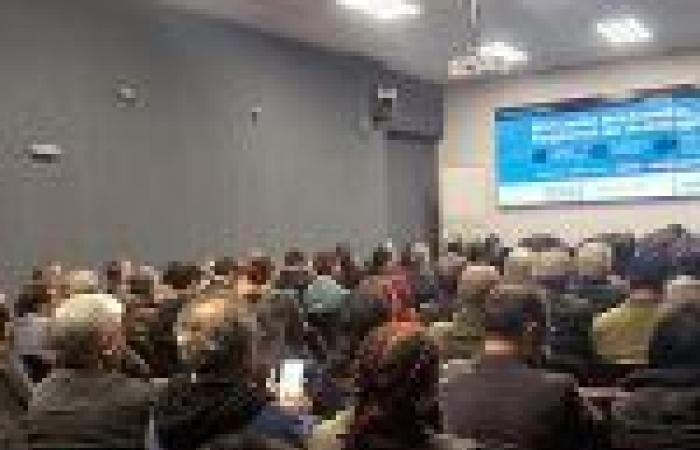
A study developed by IPP-UCN with the technical support of Feedback Research provided a complete overview of the perceptions of the area’s inhabitants.
Disinterest of the population in the upcoming elections and great concern about security, revealed the latest version of the “Antofagasta Regional Barometer Survey”, carried out by the Institute of Public Policies (IPP) of the Universidad Católica del Norte (UCN). ) with the technical support of Feedback Research.
The study, presented in collaboration with the newspaper El Mercurio de Antofagasta, addressed the perception of the population in 10 thematic areas: economy, mining, evaluation of authorities, camps, democracy, perception of problems, trust, immigration, insecurity and electoral preferences.
The work considered a quantitative study with face-to-face surveys in homes, considering a sample of 800 cases of men and women over 18 years of age residing in the communes of Antofagasta, Calama and Tocopilla. The sample was collected between April 26 and May 18 of this year.
RESULTS
The results of the survey were presented by the director of the IPP-UCN, Cristian Rodríguez Salas, who highlighted that the regional Barometer has been perfected over time. “We have 13 versions of this instrument,” he recalled.
In economics, indicators show that more than 60% of the population indicates that the country and the region are a little or much worse than twelve months ago. Meanwhile, on a personal level, more than half of those surveyed expressed that their situation is regular.
In relation to the most important problems that affect us, 73% point to crime as the main one in the country, while in the region it reaches 64%. The increase in the cost of living and immigration are in second and third place among the most worrying problems.
Regarding the perception of mining activity, more than 80% of the population considers that this activity contributes a lot to the development of the country. However, this perception drops when asked about its contribution to the development of the Antofagasta region, where more than 50% consider that it contributes little. Codelco Chuquicamata and Escondida | BHP are the best-known and most trusted mining operations; while 81% of the people surveyed agree or strongly agree with the development of mining in the region. Likewise, the study showed that 65% agree or strongly agree with the alliance between SQM and Codelco to produce lithium in Northern Chile.
The organization that generates the most trust among the population is Fundación Minera Escondida (18%); while of the educational institutions in the Antofagasta region, the one that generates the most trust is Universidad Católica del Norte (UCN) with 52%. The company in the area that leads this indicator is Puerto Antofagasta (10.6%).
Regarding the evaluation of the authorities, the President of the Republic Gabriel Boric showed until May 2024 an approval of 15%, a disapproval of 58%, and 27% who neither approve nor disapprove of his leadership of the Government. As for the regional authorities, on a scale of 1 to 7, the best rated was the mayor of Calama with a 5.0; while the worst evaluated was its pair from Antofagasta, with a 2.5.
The impact of immigration and people from other countries coming to live in the area is rated as bad or very bad by 68%, 28% consider it average and 3% rate it as good. Similarly, 89% agree or strongly agree with the statement that the camps are a source of insecurity and crime; while 64% agree or strongly agree that they should be cleared as soon as possible.
The data obtained from the survey in the item related to perception of insecurity show that 87% of people indicate that the number of crimes in their commune is higher than 12 months ago. 84% say that they are more violent and 88% believe that crime will increase in the coming months. Similarly, the assessment of democracy remains high, with 71% of respondents stating that it is preferable to any other form of government.
In relation to the upcoming electoral processes, the study indicates that more than 85% of those surveyed do not know who to vote for, are undecided, will vote void or for no candidate in the 2025 presidential elections. This situation is repeated around the municipal elections of October 27 of this year, where 78.6% of those interviewed in Antofagasta do not know or do not respond or will not vote for any of the candidates. In Calama, the situation varies, since the respondents who answered do not know, do not respond or would not vote for any candidate rise above 62%. However, it shows an intention to vote for the current mayor Eliecer Chamorro (FRVS), with 23.4%. In Tocopilla, those who would not vote for any candidate, those who do not know or do not respond reach 61.8%. In that commune, the candidate with the highest voting intention is the independent Luis Moyano, with 10%.
In the case of the election for the regional governor of Antofagasta, the situation is even more marked, since 82.9% of those surveyed would not vote for any candidate, would vote void or do not know or do not respond.
REGIONAL STUDY
The Antofagasta Regional Barometer Survey was created eight years ago by the IPP-UCN with the aim of understanding citizen perceptions on the main issues on the public agenda. This tool contributes to the realization of academic studies and to the decision-making of civil society actors, both public and private.
The presentation of the results of this version was attended by the general manager of the El Norte Journalistic Company, Emelnor, Carlos Rodríguez; and the CEO of Domolif and member of the Barometer Survey board, Pamela Chávez.
The general director of Environmental Linkage of the UCN, Olga María Valdés, also participated, who highlighted the decentralizing nature of the study and its value as a tool so that different entities that have the role of making decisions can do so, understanding what the community says. . “We are convinced as a University to support everything that contributes to regional development”he emphasized.
The results were analyzed by the sociologist from the University of Chile, managing partner of Feedback Communications and president of the Chilean Association of Market and Public Opinion Researchers and Consultants of Chile, Juan Pardo Escámez. Likewise, the information was commented and analyzed in two panels moderated by the director of the newspapers El Mercurio de Antofagasta and El Mercurio de Calama, Víctor Toloza.
The first group was made up of Cristóbal Marshall, Vice President of Corporate Affairs at Escondida | BHP; Felipe Alveal, Manager of Public Affairs at AMSA North; Ana Fabres, Manager of HR and Social Responsibility at the Altonorte Metallurgical Complex; and Germana González, Deputy Manager of Public Affairs at SQM Lithium.
The second panel, focused on security, was made up of Juan Opazo, Minister of the Court of Appeals in the Chilean Judiciary; Juan Castro, regional prosecutor of Antofagasta; and General Cristian Montre, head of the Antofagasta Zone of the Carabineros of Chile.





